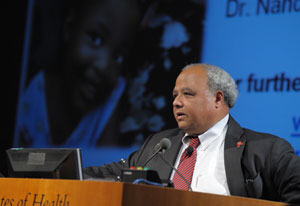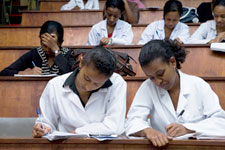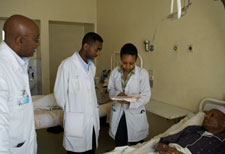NIH research essential to global AIDS relief efforts
January / February 2012 | Volume 11, Issue 1

Photo by Bill Branson/NIH
Ambassador Eric Goosby, the U.S. Global AIDS
Coordinator, told an NIH audience that research
discoveries are preventing millions of deaths from
HIV/AIDS and slowing disease transmission in the
developing world.
NIH-supported advances in science are helping keep alive millions of people with HIV/AIDS and are dramatically lowering transmission rates in developing countries, said U.S. Global AIDS Coordinator, Ambassador Eric Goosby, in a recent address to NIH leadership and staff.
Goosby, who leads the President’s Emergency Plan for AIDS Relief (PEPFAR), cited the importance of three critical interventions based on NIH research: treatment of HIV infection with anti-retroviral drugs, male circumcision to decrease the likelihood of disease transmission and interventions that prevent the virus passing from mother to child.
These discoveries make it possible for the Administration to consider for the first time the possibility that an AIDS-free generation may be within reach, he said, "a goal that would have been unthinkable, even several years ago."
NIH is a critical partner in the battle against AIDS, he said, with many of the early breakthroughs in understanding HIV and how to treat it flowing from NIH’s scientific mandate. "These advances have been fundamental to the steps PEPFAR has made in rapidly expanding the HIV response in low-income countries with high burdens of HIV disease," he declared. "This link, between knowledge generation and rapid deployment in the epicenter of the pandemic, makes for a powerful combination."

Photo by Richard Lord for Fogarty/NIH
Ambassador Eric Goosby, the U.S. Global
AIDS Coordinator, said improving
medical education and increasing local
capacity are critical to winning the battle
against HIV in developing countries.
It’s estimated PEPFAR has prevented about 2 million deaths since it began operation in 2003, Goosby said. The initiative now supports treatment of 3.9 million people in 30 developing countries. By reducing commodities costs and shipping expenses - together with using evidence to decide the most effective interventions to adopt - he reported the cost of treatment per person has dropped from nearly $1100 per year to $335, allowing for greater numbers to be reached.
The lives saved have a tremendous effect on families, he noted. "For every 1,000 people we support on treatment for one year we avert the orphanhood of 449 children." In addition, testing and treating pregnant women with HIV has allowed more than 200,000 infants to be born without the virus. PEPFAR also took note of NIH-supported research that shows male circumcision reduces risk of heterosexual transmission by more than 60 percent. It’s already funded about one million male circumcisions in its countries of operation and is scaling up the effort.
"Making smart investments is really investing in what works," Goosby said. The current economic constraints make that more important than ever. "Programs must demonstrate value and impact in order to be prioritized within complex and resource-constrained environments," he said. Better understanding of program outcomes "can be used to inform midcourse corrections in the scale-up of new interventions, or to reevaluate investments in programs for which the impact is less clear," he added. "Implementation science has proven to be a valuable tool not only to improve program effectiveness, but also to explain what worked, why, and under what circumstances."
At the same time, PEPFAR is working "to ensure that we don’t win our battles against the epidemic but lose the larger war to develop the local capacity to lead national health and development responses," Goosby said. This translates into training health care workers, addressing chronic as well as infectious diseases and using supply chains constructed for HIV commodities to deliver bed nets and other medical supplies.
"Improving public health requires creating a lasting, durable improvement in the capacity of our partner countries to address their needs. Part of our challenge is thus to ensure that as we move science into programs, we are also supporting the development of capable leadership, good governance, peace and stability, and sensible economic and social policies," he stated. "But if we want our impact to last, there really are no shortcuts."

Photo by Richard Lord for Fogarty/NIH
To foster country ownership, PEPFAR has formed 21 agreements with its partner countries. "We are working to put them in the driver’s seat of their national HIV responses," Goosby said. "For HIV as for other development issues, countries must lead their own responses, and we must model our commitment to be supportive partners as they assume increasing responsibility."
Goosby highlighted the Medical Education Partnership Initiative (MEPI), co-administered by Fogarty, designed to develop medical education in sub-Saharan Africa, invest in innovative technologies and improve educational resources. MEPI, funded by PEPFAR and NIH, "is fostering indigenous capacity to strengthen health systems in a sustainable manner," said Goosby. "If we are to make a truly lasting difference in our health and development programs, we must support this kind of work."
Goosby urged the NIH scientists to carry on the long but winnable fight against HIV. "You are part of that continuum of creating and applying scientific knowledge for the good of the world," he said. "And in doing so, you are answering the call to create capacity so that the contributions we make are lasting ones."
The address was the 11th annual David E. Barmes Lecture in Global Health, sponsored by Fogarty and the National Institute for Dental and Craniofacial Research in honor of the late Dr. Barmes, a public health dentist committed to improving health in low-income countries.
More Information
To view Adobe PDF files,
download current, free accessible plug-ins from Adobe's website.